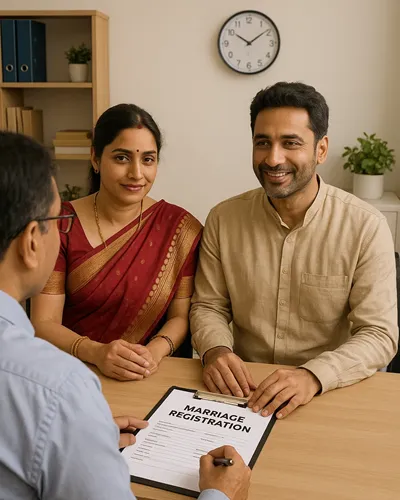Marriage Registration in India: Documents, Fees, and Procedure

Marriage registration is a legal act which makes your marriage binding under Indian law. It can be done under the Hindu Marriage Act, 1955, for Hindus, Buddhists, Jains, and Sikhs, or under the Special Marriage Act, 1954, for interfaith Appointments or any special cases.
Why Register?
- Proof of marriage in legal documents
- Required for visa, bank, property or insurance claims
- Filing in legal dispute or in separation cases
Documents Required (common for both Acts)
- Age proof (Birth certificate, school certificate, passport, etc.)
- Address proof (Aadhaar, Voter ID, Passport, etc.)
- Passport-size photographs of both partners
- Marriage invitation card (if available)
- Marriage photographs
- Witnesses' ID proofs (usually 3 witnesses required)
- Affidavit of marriage (as per local rules)
Fees
Varied in states: ₹100-₹500 approx for the Hindu Marriage Act and ₹500-₹1000 approx for the Special Marriage Act.
Procedure
- Filling up Application-Online or through the local marriage registrar/sub-registrar's office.
- Submission of Documents – With witness signatures.
- Verification-Registrar checks eligibility & documents.
- Registration & Certificate – Same day for the Hindu Marriage Act or after a 30-day notice period for the Special Marriage Act.
Key Tip:
To produce multiple copies of the marriage certificate for official use.
Marriage Registration – FAQs
-
1. Is there a compulsory provision for marriage in India?
-
Yes, the Supreme Court has made registration of marriage compulsory in all states to ensure legal proof.
-
2. What law is applicable for the marriage registration?
-
Hindu Marriage Act, 1955-for Hindus, Buddhists, Jains, and Sikhs.
Special Marriage Act of 1954 for interfaith or civil marriages. -
3. Can I register a marriage without any wedding ceremony?
-
Yes, according to the Special Marriage Act. You can marry and register without any traditional ceremony following a notice of about 30 days.
-
4. Which documents are required for marriage registration?
-
Proof of age, address proof, photographs, a marriage invitation card, wedding photographs and witness ID proofs.
-
5. How many are sufficient witnesses?
-
Generally, three adult ones with valid ID proofs.
-
6. Is both presence in registration necessary?
-
Yes, the physical presence of both is a must, bride and groom.
-
7. What is the fee for marriage registration?
-
Varies by state – usually ₹100-₹500 (Hindu Marriage Act), ₹500-₹1000 (Special Marriage Act).
-
8. Can i apply for marriage registration on the internet?
-
Yes, in many states. Fill out the application online and appear before the registrar to get it verified after.
-
9. What is the difference between registering an act of marriage under the Hindu Marriage Act and registering an act of marriage under the Special Marriage Act?
-
While the latter allows direct civil marriage, the former mandates the performance of a wedding ceremony before applying for registration.
-
10. What is the period of notice under the Special Marriage Act?
-
30 days, during which objections, if any, can be raised.
-
11. Can NRI marriages be registered in India?
-
Yes, provided one of the spouses has a valid address in India and the marriage is governed by Indian laws.
-
12. Is marriage registration possible even after several years of marriage?
-
Yes, if required documents are presented and statements from witnesses exist, marriage registration may occur at any time.
-
13. Do parents need to be present at registration?
-
No, if both partners are adults (18+ bride, 21+ groom).
-
14. Is court marriage and marriage registration the same?
-
Court marriage is one type of marriage under the Special Marriage Act; however, to register means to have a marriage officially recorded.
-
15. Can marriage be registered in a different city from where it was solemnised?
-
Yes, if either spouse has residence proof for that jurisdiction.
-
16. Need a certificate from the priest for the purpose of registration?
-
Only under the Hindu Marriage Act; usually, though, pictures of the ceremony are enough.
-
17. Can same-sex marriages be registered in India?
-
At present, same-sex marriages are not legally recognised in Indian laws.
-
18. How long will the registration process take?
-
Same day under the Hindu Marriage Act; at least thirty days under the Special Marriage Act.
-
19. What happens if marriage is not registered?
-
It might lead to many problems with regard to legal, monetary, or immigration purposes; some benefits may not be available to them.
-
20. Is the marriage certificate valid internationally?
-
Yes, Indian marriage certificates are valid internationally, although some countries may want the benefit of an Apostille or embassy attestation.
Add new comment